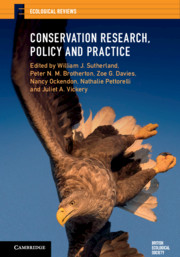
-
Select format
-
- Publisher:
- Cambridge University Press
- Publication date:
- 18 April 2020
- 16 April 2020
- ISBN:
- 9781108638210
- 9781108714587
- Creative Commons:
-
This content is Open Access and distributed under the terms of the Creative Commons Attribution licence CC-BY-NC-ND 4.0.
https://creativecommons.org/creativelicenses - Dimensions:
- Weight & Pages:
- Dimensions:
- (247 x 174 mm)
- Weight & Pages:
- 0.76kg, 368 Pages
Open AccessYou have digital access to this book
Book description
Conservation research is essential for advancing knowledge but to make an impact scientific evidence must influence conservation policies, decision making and practice. This raises a multitude of challenges. How should evidence be collated and presented to policymakers to maximise its impact? How can effective collaboration between conservation scientists and decision-makers be established? How can the resulting messages be communicated to bring about change? Emerging from a successful international symposium organised by the British Ecological Society and the Cambridge Conservation Initiative, this is the first book to practically address these questions across a wide range of conservation topics. Well-renowned experts guide readers through global case studies and their own experiences. A must-read for practitioners, researchers, graduate students and policymakers wishing to enhance the prospect of their work 'making a difference'. This title is also available as Open Access on Cambridge Core.
Reviews
'Conservation Research, Policy and Practice is an excellent handbook on how to conduct research in conservation and then translate it into an impactful outcome. It explores the complexity of horizon scanning and interacting with policy, while providing clear guidance on how to develop a Theory of Change. With an increasingly greater focus on evidence-informed policy and practice, researchers need concrete examples on how to generate and synthesise research findings, and then to communicate these findings to decision-makers; all while recognising that a degree of uncertainty is inherent to all policy-making. This book will aid anyone wishing for their research to have an impact, particularly in conservation but also any interdisciplinary pursuit.'
Dr Grant Hill-Cawthorne - Head of the Parliamentary Office of Science and Technology
'Conservation practitioners, policy makers and researchers alike will find much to interest them in this excellent book. Ecological systems are complex and sometimes unpredictable so the more clues we have to how a particular conservation management intervention might play out in the real world the greater likelihood of achieving the outcomes we are looking for. Too often, proposals for conserving a species, habitat or ecosystem are subject to confirmation bias, erroneous assumptions and flimsy evidence bases. This book challenges conservationists not only to do better but equips them with the tools to do so. It is an important contribution to the urgent planetary need to address nature’s decline and loss.'
Jonathan Hughes - Chief Executive Officer, WCMC, UN Environment Programme World Conservation Monitoring Centre
'In the Anthropocene, with the dual biodiversity and climate crises, it is imperative that conservation research results have impact. This matters to researchers, to research funders, to society and to our planet. This book illustrates that while research evidence is essential, it is only part of the mix needed to deliver impact through influencing policy, practice, and societal change. Getting evidence used involves a complex interplay between those that gather it and those that develop and implement policy, or otherwise change their practices. This requires a range of different approaches and communication techniques, and the development of strong and trusting collaborative relationships with relevant stakeholders. While there is no panacea, there are some general principles. This excellent and timely book provides a valuable tool that illustrates those principles, providing examples from a broad diversity of experience and situations.'
Debbie Pain - Honorary Professor, School of Biological Sciences, University of East Anglia and Honorary Research Fellow, Department of Zoology, University of Cambridge
‘... this book emphasizes how close working relationships among scientists, policy makers, and practitioners are increasingly critical to fulfilling conservation goals and to broadening the impacts of societal benefits. This compilation of case studies and opinion pieces provides a valuable resource for conservation researcher’s intent on engaging with both policy and practice.'
R. A. Delgado Jr. Source: Choice
Contents
Full book PDF-
Index
pp 329-336 -
-
- You have access
- Open access
- HTML
- Export citation
-
-
Plate Section (PDF Only)
pp 337-356 -
-
- You have access
- Open access
- HTML
- Export citation
-
Metrics
Altmetric attention score
Full text views
Full text views help Loading metrics...
Loading metrics...
* Views captured on Cambridge Core between #date#. This data will be updated every 24 hours.
Usage data cannot currently be displayed.
Accessibility standard: Unknown
Why this information is here
This section outlines the accessibility features of this content - including support for screen readers, full keyboard navigation and high-contrast display options. This may not be relevant for you.
Accessibility Information
Accessibility compliance for the PDF of this book is currently unknown and may be updated in the future.


